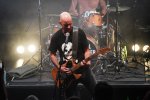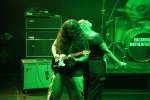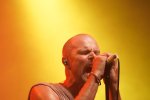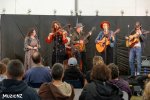Paul McLaney - MNZ Interview: It's A Wrap with Roger 007: Paul McLaney
16 Feb 2022 // An interview by roger.bowie


Muzic.net.nz's Roger Bowie talks with Paul McLaney about neo-Gramscian counterhegemony theory, the self-actualisation highs which come from performing music, the therapeutic and time travel nature of the album cover, how music stretches time, and, by the way, his voyage through the hinterlands of self which describes the fantastic new album from Gramsci.
About Paul McLaney

McLaney’s earlier efforts illustrate the many threads that he weaves into his musical tapestry. Beginning with 1998’s The Prayer Engine, a solo effort of 2000 copies sold at McLaney’s first public outings as a performer, turning through the gentle electronically-tinged folk pop of Gramsci’s first two albums Permanence (2000) and Object (2001) with collaborator David Holmes, the soul-searching acoustic purity of 2003’s The Shadows of Birds Flying Fall Slowly Down the Tall Buildings before 2005’s critically-acclaimed return of Gramsci, complete with hard-charged grandiose guitar rock, on Like Stray Voltage, McLaney has traversed musical horizons like the traveller he is.
In 2006, McLaney went south, heading to Dunedin to record his first Loop released album, Edin – at the NZBC recording studio with recording engineer, Dale Cotton, drummer Nick Gaffeney and bass player Richie Pickard. The critically acclaimed and Tui nominated album, was a turning point for McLaney and saw him come close to finding paradise, and to finding himself as a musician.
Visit the muzic.net.nz Profile for Paul McLaney
Releases
Other Interviews By roger.bowie
 MNZ Interview: It's a Wrap with Roger S02 / E09 - Velvet Arrow
MNZ Interview: It's a Wrap with Roger S02 / E09 - Velvet Arrow
19 Nov 2023 // by roger.bowie
Watch Roger Bowie rapping with Hannah Jane from Velvet Arrow about their sensational debut album Songs of Solitude, released on Saturday November 18th, 2023.
Read More...
 MNZ Interview: It's a Wrap with Roger S02 / E08 - The Mons Whaler
MNZ Interview: It's a Wrap with Roger S02 / E08 - The Mons Whaler
25 Oct 2023 // by roger.bowie
Bursting through the ocean surface just of the coast of Taranaki, The Mons Whaler breaches and cavorts, a brand new 3 now 4 piece band who play the blues, swampy blues, hill country blues, blues blues, and have just released their debut EP. Roger Bowie raps with Hemi Coates about this extraordinary new arrival on our shores and how it all came about.
Read More...
MNZ Interview: It's a Wrap with Roger S02 / E07 - Faith Wilde
19 Oct 2023 // by roger.bowie
Check out Roger Bowie rapping with Faith Wilde, from Auckland band Goodnight Faith, and currently based in America where she is living the dream in a trailer park in Branson Missouri working by day and recording into her portable studio by night. Apart from jumping on stage in Des Moines and singing Dial Drunk better than Noah Kahan himself (and he said that).
Read More...
19 Oct 2023 // by roger.bowie
Check out Roger Bowie rapping with Faith Wilde, from Auckland band Goodnight Faith, and currently based in America where she is living the dream in a trailer park in Branson Missouri working by day and recording into her portable studio by night. Apart from jumping on stage in Des Moines and singing Dial Drunk better than Noah Kahan himself (and he said that).
Read More...
 MNZ Interview: It's A Wrap with Roger S02 / E06 - Sonia & Nigel
MNZ Interview: It's A Wrap with Roger S02 / E06 - Sonia & Nigel
05 Aug 2023 // by roger.bowie
Roger raps with Sonia Wilson and Nigel Gavin in demi-francais. Hear from Sonia about what inspired her to create the most beautiful album of French songs in passionate obeisance to her hometown of Paris.
Read More...
 MNZ Interview: It's A Wrap with Roger S02 / E05 - The Mitchell Twins
MNZ Interview: It's A Wrap with Roger S02 / E05 - The Mitchell Twins
16 Jun 2023 // by roger.bowie
Roger raps firstly with Nicola Mitchell, the left half of The Mitchell Twins, whose debut EP is out today, and then segues into a clip taken in Gore a couple of weeks ago, with Jenny Mitchell and her father Ron, talking about the songs they wrote for the MLT Songwriters’ Award, one of which made the finals, and ultimately became runner-up.
Read More...
 MNZ Interview: It's A Wrap with Roger S02 / E04 - Jazmine Mary
MNZ Interview: It's A Wrap with Roger S02 / E04 - Jazmine Mary
01 Jun 2023 // by roger.bowie
Roger Bowie wraps with Jazmine Mary in advance of the release of their sophomore album, Dog, tomorrow, Friday June 2nd. In spite of what the PR says about them not wanting to comment, there’s a lot of insight about how Jazmine Mary writes and arranges and collaborates and generally approaches life.
Read More...
 MNZ Interview: It's A Wrap with Roger S02 / E03 - You, Me, Everybody
MNZ Interview: It's A Wrap with Roger S02 / E03 - You, Me, Everybody
24 May 2023 // by roger.bowie
Roger Bowie catches up with Laurence, Nat and Rob from You, Me, Everybody as they get ready to tour in July, and are feeling the love from the massive response to their song Stranger being on the soundtrack for series 2 of Netflix’s Sweet Tooth. Also a side-track into the world of AI and it’s impact on song writing: (spoiler alert, it will not be good).
Read More...
 The Veils - MNZ Interview: It's a Wrap with Roger S02 / E02 - Finn Andrews
The Veils - MNZ Interview: It's a Wrap with Roger S02 / E02 - Finn Andrews
03 Mar 2023 // by roger.bowie
Roger Bowie raps with Finn Andrews about the captivating new album from The Veils which is out today. His review of the album is also available now.
Read More...
Most Viewed Artists
Latest Galleries
NZ Top 10 Singles
- APT.
ROSÉ And Bruno Mars - DIE WITH A SMILE
Lady Gaga And Bruno Mars - BIRDS OF A FEATHER
Billie Eilish - TASTE
Sabrina Carpenter - I LOVE YOU, I'M SORRY
Gracie Abrams - ESPRESSO
Sabrina Carpenter - SAILOR SONG
Gigi Perez - LOSE CONTROL
Teddy Swims - A BAR SONG (TIPSY)
Shaboozey - GOOD LUCK, BABE!
Chappell Roan












 Report A Problem
Report A Problem

